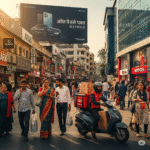Introduction
Uttar Pradesh (UP), with its 80 Lok Sabha seats, has long been considered the heartland of Indian politics. While national parties like the BJP and Congress dominate headlines, regional parties such as the Samajwadi Party (SP) and Bahujan Samaj Party (BSP) play an equally pivotal role. These parties not only influence UP’s political dynamics but also act as catalysts for change in national politics. This article examines the significance of regional parties in UP and their impact on India’s broader political landscape.
The Rise of Regional Powerhouses
1. Samajwadi Party (SP)
Founded in 1992 by Mulayam Singh Yadav, the SP has been a dominant force in UP politics.
- Ideological Focus:
- Advocates for socialist policies and champions the rights of the Other Backward Classes (OBCs) and minorities.
- National Influence:
- Played a crucial role in coalition governments, including the United Front government (1996-1998).
- Currently led by Akhilesh Yadav, the SP continues to influence national debates on social justice and federalism.
(Source: Election Commission of India)
2. Bahujan Samaj Party (BSP)
Founded in 1984 by Kanshi Ram and later led by Mayawati, the BSP has been a voice for Dalits and marginalized communities.
- Core Philosophy:
- Focuses on the empowerment of Dalits, Adivasis, and other socially disadvantaged groups.
- National Impact:
- The BSP’s support was instrumental in the formation of the United Progressive Alliance (UPA) in 2004.
- Mayawati remains a key figure in discussions around caste equity and reservation policies.
(Source: PRS Legislative Research)
3. Rashtriya Lok Dal (RLD)
While smaller in size, the RLD, led by Jayant Chaudhary, represents the voice of western UP’s farmers.
- Focus Areas:
- Agrarian issues, land reforms, and rural development.
- Influence:
- Often acts as a kingmaker in tightly contested elections, particularly in alliances with larger parties.
(Source: UP Government Reports)
How Regional Parties Influence National Politics
1. Coalition Building
Regional parties from UP have historically played decisive roles in forming coalition governments at the center.
- Examples:
- SP and BSP have supported both Congress- and BJP-led alliances in the past, showcasing their importance as swing players.
2. Policy Prioritization
These parties bring regional issues to the national stage, ensuring that marginalized communities and rural concerns receive attention.
- Focus Areas:
- Agrarian distress, caste-based equity, and employment opportunities.
3. Shaping Electoral Trends
By mobilizing caste and community-based vote banks, regional parties influence broader political strategies, compelling national parties to adapt their narratives.
Challenges Faced by Regional Parties
1. Erosion of Vote Banks
- The consolidation of OBCs and Dalits by larger parties like the BJP has weakened the traditional voter bases of the SP and BSP.
2. Limited Resources
- Regional parties often lack the financial and organizational strength of national parties, limiting their outreach.
3. Internal Leadership Struggles
- Leadership transitions, such as the shift from Mulayam Singh Yadav to Akhilesh Yadav, have occasionally caused rifts within the SP.
Strategies for Revitalization
1. Strengthening Grassroots Outreach
- Expanding their presence in rural and semi-urban areas can help regional parties reconnect with their core voter bases.
2. Strategic Alliances
- Collaborating with like-minded parties on specific issues, such as farmers’ rights or education reform, can amplify their influence.
3. Embracing Youth and Technology
- Engaging with young voters through digital platforms and addressing contemporary issues like employment and education can rejuvenate their appeal.
Expert Opinions
- Political Analyst’s View:
- “Regional parties in UP act as crucial intermediaries between local concerns and national policy-making. Their role in coalition politics makes them indispensable.”
- Sociologist’s Insight:
- “The SP and BSP have redefined caste and class-based politics in India, bringing marginalized voices to the forefront of governance.”
(Source: UP Legislative Assembly Reports)
Conclusion
Regional parties in Uttar Pradesh are more than just players in state politics—they are catalysts for change in the national political landscape. Despite challenges, their ability to mobilize communities, influence coalitions, and prioritize regional issues ensures their continued relevance. As India’s democracy evolves, the role of these parties in shaping both regional and national discourse will remain significant, making them vital stakeholders in the country’s political future.



















